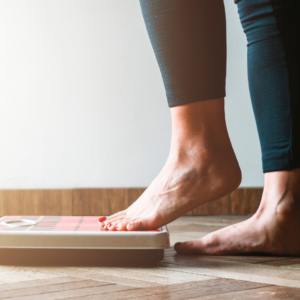Causes of Weight Gain that Are NOT Eating too Much or Exercising Too Little
 Many women that come to see me have been feeling unwell for years. But it is their weight gain that brings them through my door.
Many women that come to see me have been feeling unwell for years. But it is their weight gain that brings them through my door.
Weight gain is a symptom, not a health condition.
It is a symptom of feeling unwell, stress and lack of sleep.
To make matters worse, it is often made worse from years of dieting since eating too few calories paired with too much cardio will leave your metabolism in the dirt! The problem is that our society fails women in so many ways. Our diet culture tells women that if they are gaining weight it has to be that they are eating too much and not working hard enough. Our medical community blames the weight for her other health concerns. Instead of giving her a proper work-up to see what is making her feel unwell, she is left with a prescription to lose weight!
BUT HOW? Most of the time, when I meet a woman, she has already done the diets. She has starved herself, she has cut out meals, she has counted and measured. At this point she feels unwell, she is burnt out, her weight is even higher, and she thinks it is all her fault.
There are a couple of problems here:
#1 Yo-yo dieting can affect your metabolism for years. It can cause hormonal changes that alter the hormones that manage your stress and hunger, resulting in increased hunger and causing your body to hold on to fat. In addition, calorie restriction does not control where the weight loss is coming from. Therefore, when you do lose, you will lose fat and muscle. If you lose muscle you lose your metabolism. As soon as you eat more again, you gain it all back and more.
#2 The weight is usually a symptom of something else going on it the body. If you don’t find what the cause is, there is no solution.
So, what are causes of weight loss that don’t have to do with calorie excess??
Lack of Sleep
Sleep is essential to our health. Sleep deficiency has been associated with obesity, diabetes, cardiovascular disease, depression and even early death. Less than 7 hours of sleep significantly increases risk of weight gain. This is because lack of sleep disrupts the hormones that regulate our feelings of hunger and fullness. This promotes cravings for carbohydrates. In addition, when we sleep less we feel worse leading to cravings for foods and drinks that will activate the “reward” areas in the brain- foods higher in fat and calories. Lastly, sleep deprivation increases fat storage in the belly area and insulin resistance. This makes it harder to lose the weight once it comes on.
Thyroid Conditions
The thyroid impacts weight directly and indirectly. The thyroid gland controls every aspect of metabolism. When the thyroid is low functioning (hypothyroidism) metabolism slows leading to weight gain. In addition, hypothyroidism causes fatigue therefore decreasing daily activity. Just like with sleep disturbances, when you feel worse your brain craves foods that will satisfy that reward centre in our brains.
Too much alcohol
Calories from alcohol affect our bodies differently than calories from other food because it does not contribute to fullness, and might even make us more hungry. For women, alcohol can make PMS, and menopausal symptoms worse and can also contribute to sleep disturbances making us feel more unwell and as indicated above, more likely to make poorer choices in our diets to serve our brain’s reward centres. In addition, alcohol itself serves our brains reward centres which, in the short term, can make us think it is making us feel better.
Insulin Resistance
Insulin resistance is the driving factor of Type 2 Diabetes, but you don’t have to have diabetes to have insulin resistance. Insulin allows our body to use sugar as fuel or be stored as fat. If the body becomes resistant to insulin it tries to cope by producing more insulin. More insulin results in fatigue, increased hunger and brain fog (difficulty concentrating). This is a vicious cycle where insulin increases belly fat storage, the belly fat makes the insulin resistance worse, the increase in insulin results in feeling worse and therefore making poorer food choices. Even when trying to improve food choices, the high insulin promotes storage making it harder to lose fat.
Stress
Poorly managed stress increases cortisol levels. Cortisol stimulates appetite, increases cravings for calorie dense foods- fatty, salty and sweet. High levels of stress also increase the potential for insulin resistance and it negatively affects sleep. Therefore, stress can contribute directly to weight gain as well as contributing to other causes of weight gain.
When it comes to weight management, the solution is multifaceted. An important part of the solution is finding the cause. Telling women that they are the problem is only contributing to the problem! At Health Over All, our programs are targeted at treating the causes and addressing the discrepancies in women’s health care.
Don’t get me wrong, dietary changes are often part of the prescription regardless of the cause. This is because nutrient deficiencies and dietary choices that aren’t working for your body will contribute to the problem regardless of the cause. BUT dramatic caloric restriction or avoiding carbs like the plague are NOT going to solve any problems and should not be part of your nutrition plan.
If you want more information about how we can help you we would love to hear from you.
Book your free Alignment Call HERE to find out how you can work with us.
In health,
Dr. Lisa Maddalena, ND
Leave a Reply